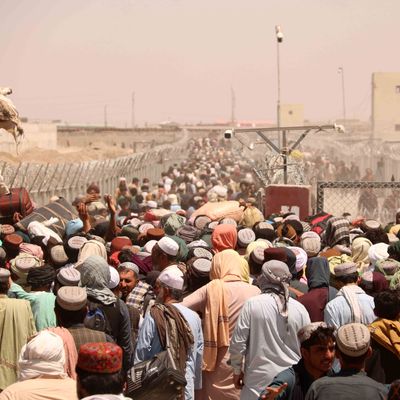
Afghanistan had barely fallen to the Taliban when the fear-mongering began. “If history is any guide, and it’s always a guide, we will see many refugees from Afghanistan resettle in our country, and over the next decade, that number may swell to the millions,” Tucker Carlson warned on his Monday-evening broadcast. “So first we invade, and then we are invaded.” Laura Ingraham struck a similar note later that night. “Is it really our responsibility to welcome thousands of potentially unvetted refugees from Afghanistan?” she asked. “All day, we’ve heard phrases like, ‘We’ve promised them.’ Well, who did? Did you?”
Ingraham feigns ignorance for a reason. It’s her job. Carlson, too, is only doing what viewers expect of him. Islamophobia has a long history in this country; the nativism it represents is so powerful that it helped propel 20 years of war. Carlson and Ingraham will not be the last conservative voices to protest the presence of Afghan refugees. The history of the global war on terror, including the direct aftermath of 9/11 at home, suggests that Afghan refugees will be subject to a tide of prejudice. There will be backlash to resettlement, and the Biden administration reportedly fears it.
“It’s like they want the credit from liberals for ending the Trump cruelty to immigrants and refugees but they also don’t want the political backlash that comes from actual refugees arriving in America in any sort of large numbers,” an anonymous administration official told Politico. This is cowardice of the rankest order. America owes the people of Afghanistan. The U.S. government made promises to the taxpaying public, who subsidized the long war, and to the Afghan people themselves. It did not keep those promises, and the only way to salvage whatever remains of its self-satisfied image is to throw the doors open wide to refugees who wish to enter.
Consider the last report from SIGAR, the Special Inspector General for Afghanistan Reconstruction, which provides a detailed litany of American failures. Consistent themes are apparent, all thin code for one stupid, bloody fact: The U.S. didn’t know what it was doing in Afghanistan, and the Afghan people have paid the price for its ignorance. Or put it another way: “The U.S. government continuously struggled to develop and implement a coherent strategy for what it hoped to achieve,” the SIGAR report reads. Again: “The U.S. government consistently underestimated the amount of time required to rebuild Afghanistan, and created unrealistic timelines and expectations that prioritized spending quickly. These choices increased corruption and reduced the effectiveness of programs.” And again: “Many of the institutions and infrastructure projects the United States built were not sustainable.” On it goes, a depressing laundry list with a body count attached to it.
This isn’t all down to Biden, though his tenure in power means that he, along with the rest of his party, bear significant responsibility for the quagmire Afghans are trying to escape. The war in Afghanistan was a bipartisan adventure involving four different presidents. It fell to the last to devise a way out, and because victory had become impossible to even define, leaving was the only option left. Biden was correct to pull troops out of Afghanistan, but his decision to do so doesn’t seem to represent a reversal of the kind of Beltway thinking that kept the United States in Afghanistan for 20 years. Even in leaving, Biden couldn’t resist one final dig at the people he’d abandoned. “American troops cannot and should not be fighting in a war and dying in a war that Afghan forces are not willing to fight for themselves,” he said. “We gave them every chance to determine their own future. What we could not provide them was the will to fight for that future.” The problem is always someone else. America cannot fail; it can only be failed.
America makes many promises to itself and to the world, and it isn’t very good at keeping them. Our national exceptionalism is lofty in scope: America is a shining beacon of freedom and prosperity, an example, even, to the dark corners of the world. Elected officials in both parties uphold the nation as something for others to emulate, to learn from; reality often falls short of the pitch. Not only do we regularly fail to deliver justice or equality or dignity at home, we also fail to deliver it elsewhere. The American government didn’t just lose money, or lives, in Afghanistan — it lost a vital part of its own moral core, if indeed such a core existed in the first place.
The images coming out of Afghanistan, of people fleeing certain repression and death, do indict America, and they demand an answer. The only appropriate response is to implement a form of reparations, as journalist Spencer Ackerman has argued. “Reparations is a charged word, and I do not use it here to suggest that reparations for the descendants of the enslaved ought to wait until we pay reparations for the War on Terror,” he wrote. “I mean here that throughout history, the losers of wars have had to pay reparations, though typically to the regimes and not people. But it is people whom the U.S. owes, not regimes.” We should accept and resettle all refugees who wish to come here and assist them in finding homes, work, and schools — whatever they need to start new and dignified lives. They deserve that much and more. Accepting Afghan refugees is now the only way for America’s promises to mean anything. If doing so forced a broader reckoning with the imperialism that kept us in Afghanistan for so long, that would be a bonus. We cannot continue the way we’ve been going. In the absence of change, all that awaits us and our allies is failure and death. America could become a haven, if it chose. Now’s the time to start.






























